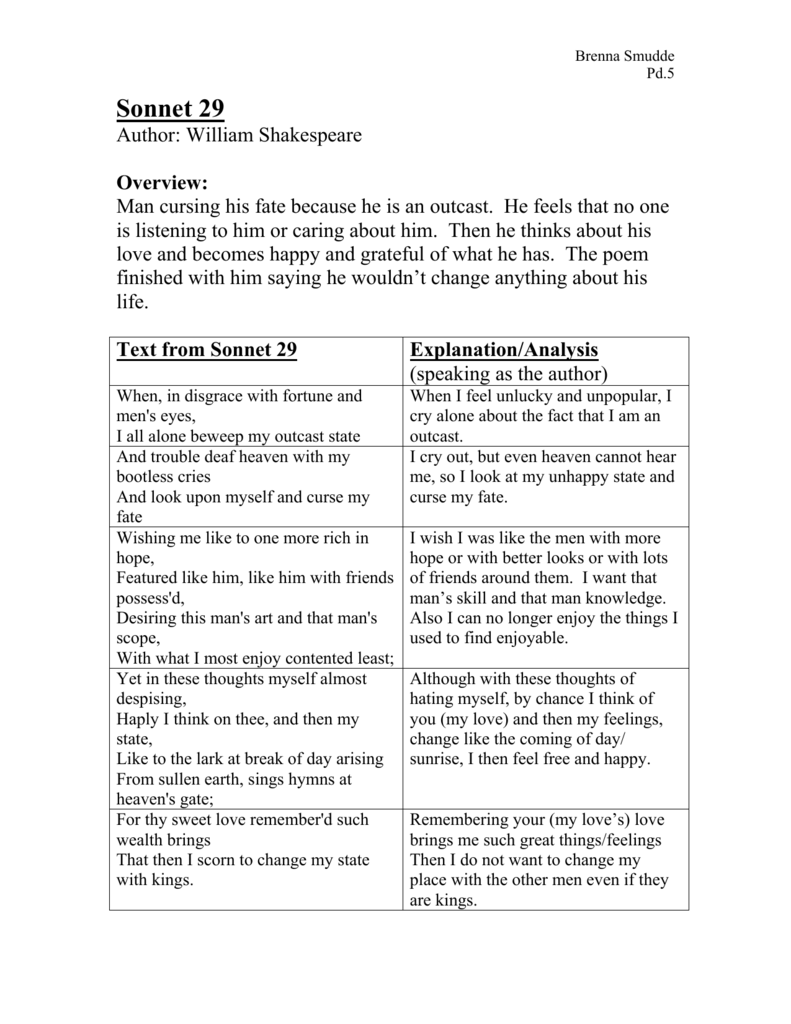
+in+Sonnet+29.jpg)
He then explains what he has been through with nightmares keeping him up at night.
SHAKESPEARE SONNET 29 FULL
The third stanza then takes a turn to darkness and he then goes after the people who have warned him about his lifestyle, “You don't really care about the trials of tomorrow, rather lay awake in the bed full of sorrow.” (22) then he accuses people of not knowing what he has been through leading him to where he stands in life now. In these poems, the speaker expresses his love and adoration for a young man.

‘ When, in disgrace with fortune and men’s eyes’ by William Shakespeare is part of the Fair Youth sequence of poems. This transitions into the second stanza where he says “I'm on the pursuit of happiness and I know that everything will shine ain't always gonna be gold.” (9) claiming that once happiness is found everything will be positive, still ignoring the warning from others to stop his rebellious pursuit of his happiness. Read Shakespeare’s Sonnet 29, ‘When, in disgrace with fortune and men’s eyes,’ with a summary and complete analysis of the poem. He knows that the way he is living his life is wrong, “If I fall if I die, know I lived my life to the fullest.” (7) People are warning him and telling him to stop, but he wants to find peace, joy and a distraction from his evil reality, he does this by making daring choices. The use of this word shows that even though he may feel bad about his current situation, he has not hit rock bottom and therefore there is hope to The line is “Yet in these thoughts myself almost despising,” and the word to remember is almost.

One important word to point out is in the first line of the third quatrain. Start by marking Sonnet 29 (When in disgrace with Fortune and men’s eyes) as Want to Read: Want to Read. It’s not until the third quatrain that the whole mood of the sonnet flips. Goodreads helps you keep track of books you want to read. The first line states that when he thinks on all these prior thoughts, he …show more content… The first two quatrains of this sonnet all show examples of how the speaker feels about himself and his situation. Once the third quatrain begins, the speaker starts to change moods but not completely at first.

What causes the poet's anguish will remain a mystery as will the answer to whether the sonnets are autobiographical. He feels unlucky, shamed, and fiercely jealous of those around him. He goes as far as to state “Featured like him like him with friends possessed, Desiring that mans art, and that mans scope.” In the final line of the second quatrain the narrator decides that even the things that he used to enjoy doing the most, he now can no longer enjoy. Sonnet 29 shows the poet at his most insecure and troubled. He starts to wish for other men’s lives instead of his own. In the second quatrain of the sonnet the speaker begins to wish for a more hopeful future than the bleak one he currently envisions. When he chooses to look upon himself, he see’s no happy ending and only further sadness in his future. He goes as far as to describe his cries to heaven as “bootless” meaning useless. The current state that the speaker is in is constantly saddening and even heaven refuses to pay any attention to him. The speaker also mentions Fortune, referring to Dame Fortune, the goddess of fate and fortune. The speaker begins by stating that he feels down on his luck and feels like he has no friend’s and is therefore unpopular. The first eight lines set forth the general situation in a conditional sense: "When I am alone and unhappy with my lot in life, envying others and wishing things were different than they are", and the volta or turn comes in the ninth line with the word "Yet": "At those times, I chance to remember you, and thinking about you, my spirits rise." The final couplet concludes "Because when I remember you and your love, I feel so blessed that I would not trade places with a king.Shakespeare begins his work titled Sonnet 29 with the speaker in a rather depressed state. That then I scorn to change my state with kings.Īnalysis: In form, a Shakespearean sonnet, of course: rhymed ABABCDCDEFEFGG, written in iambic pentameter. Haply I think on thee, and then my state,įrom sullen earth, sings hymns at heaven's gate įor thy sweet love remembered such wealth brings Yet in these thoughts myself almost despising, Wishing me like to one more rich in hope,įeatured like him, like him with friends possessed,ĭesiring this man's art, and that man's scope, When in disgrace with Fortune and men's eyes,Īnd trouble deaf heaven with my bootless cries, It seems a good fit for poor Richard Plantagenet, who was portrayed as such a broken, evil man by Shakespeare (who was, after all, writing the play to curry favor with Elizabeth I, the descendant of Richard's opponent, Henry Tudor). KellyrfinemanFollowing the big news about the finding of the body of Richard III the other day, this sonnet came to mind today as I was casting about for what to post for this week's Wednesday with the Bard.


 0 kommentar(er)
0 kommentar(er)
